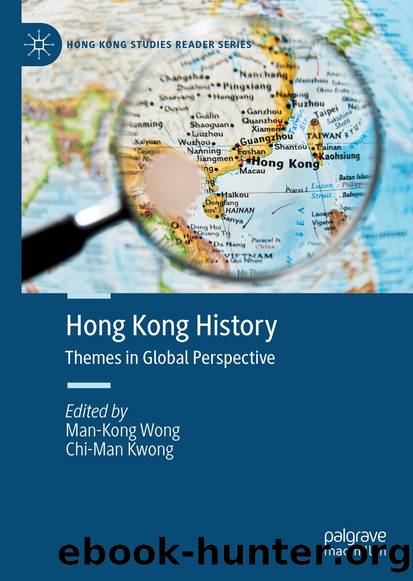Hong Kong History by Unknown

Author:Unknown
Language: eng
Format: epub
ISBN: 9789811628061
Publisher: Springer Singapore
Possible New Directions of Research
While scholars have begun to study the life and career of Chinaâs intellectuals in Hong Kong and assess their impact on the local society, there is still a lot of room for research. In this section, I shall point out several possible directions for future research and address their relative importance to the study of Hong Kong history.
First of all, we may look into the Hong Kong phase of pre-1949 âsouth-coming intellectualsâ in depth. It is true that late Qing exiles only took shelter in the city for a short while, but historians can still place their activities in the context of Hong Kong history. John Y. Wong and Mo Shixiang have done pretty much work on Sun Yat-sen and his revolutionary activities. As for other political activists, focus can be put on the significance of their presence in Hong Kong to the colonial governmentâs assessment of Chinese politics. It will also be interesting to look at how their visit to Hong Kong stimulated nationalistic sentiment in the city. There is definitely no lack of surveillance reports on their activities in the Hong Kong Government Records Service and the National Archives of the United Kingdom. Newspapers may also provide relevant clues. Through this direction, we will be possibly able to understand how these political exilesâ Hong Kong experience shaped the colonial governmentâs responses to the changing political circumstances in Mainland China.
A problem in the existing scholarship on the incoming intellectuals in the Republican period is that many of these studies are focusing on their contribution to the development of modern Chinese literature rather than their historical significance to Hong Kong society. Fortunately, Lau Chi Pang and Chiu Yu Lok have done some preliminary work in this aspect. Again, newspapers reporting the activities of these intellectuals shall be used. Their writings are indeed precious primary sources for understanding their perception of Hong Kong and their feeling of being in self-exile in the British colony. Their contribution to Hong Kongâs Chinese-language education and their interaction with the local elite are particularly worth studying. Like the local elite and businessmen, these intellectuals were likely to be shaping Hong Kong society in the pre-war years as well.
Proceeding to the post-1949 era, we also witness more frequent political participation of Chinese intellectuals in Hong Kong politics. When researching Hong Kong-based Chinese intellectuals in this period, scholars usually think of the cultural conservatives such as Qian Mu, Tang Junyi and Mou Zongsan, looking at their scholarship, philosophy, and political thought and praise their high aim of rejuvenating Chinese culture in Hong Kong. Grace Ai-ling Chou has made a breakthrough in examining their effort in consolidating a Chinese-language tertiary college for non-English speaking students in the city. Her approach is admirable and paves the way for further research on these cultural conservativesâ impact on the local society. However, cultural conservatives were not the only group of self-exiles who arrived in Hong Kong after 1949. There were indeed several anti-Communist political activists sojourning in the city in the 1950s whom scholars almost neglected.
Download
This site does not store any files on its server. We only index and link to content provided by other sites. Please contact the content providers to delete copyright contents if any and email us, we'll remove relevant links or contents immediately.
Kathy Andrews Collection by Kathy Andrews(11801)
The remains of the day by Kazuo Ishiguro(8962)
Paper Towns by Green John(5173)
Spare by Prince Harry The Duke of Sussex(5172)
The Body: A Guide for Occupants by Bill Bryson(5070)
Industrial Automation from Scratch: A hands-on guide to using sensors, actuators, PLCs, HMIs, and SCADA to automate industrial processes by Olushola Akande(5042)
Machine Learning at Scale with H2O by Gregory Keys | David Whiting(4289)
Be in a Treehouse by Pete Nelson(4029)
Never by Ken Follett(3928)
Harry Potter and the Goblet Of Fire by J.K. Rowling(3839)
Goodbye Paradise(3795)
The Remains of the Day by Kazuo Ishiguro(3388)
Into Thin Air by Jon Krakauer(3382)
Fairy Tale by Stephen King(3364)
The Cellar by Natasha Preston(3328)
The Genius of Japanese Carpentry by Azby Brown(3281)
120 Days of Sodom by Marquis de Sade(3255)
Reminders of Him: A Novel by Colleen Hoover(3067)
Drawing Shortcuts: Developing Quick Drawing Skills Using Today's Technology by Leggitt Jim(3063)
